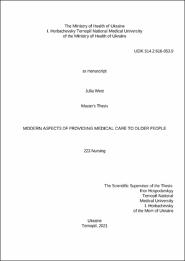MODERN ASPECTS OF PROVIDING MEDICAL CARE TO OLDER PEOPLE 223 Nursing The Scientific Supervisor of the Thesis: Ihor Hospodarskyy Ternopil National Medical University I. Horbachevsky of the MoH of Ukraine Ukraine Ternopil,
Abstract
The significant surge of the interest in medical and social factors of aging in the recent years has been triggered by the abrupt changes in the demographic structure of human societies. According to the UN predictions, by 2025 global human population will increase threefold compared to 1950, and the number of the older people will increase sixfold. The role and the place of the older people in the societies have been determined by the United Nations Principles for Older Persons adopted by General Assembly resolution 46/91 of 16 December 1991, which have provided for autonomy, access to care, participation in social development, possibilities for personal fulfillment and maintaining dignity.
Healthcare services should be available to older people, regardless of specialization and technological sophistication, and should be provided in all healthcare institutions providing specialized, including high-tech medical care. The advanced age should not be a reason for denying any kind of medical care, including hospital admissions, and the quality of medical services provided to older patients should be consistent with the objective of maintaining a high quality of life of older people from all societal strata, regardless of their material well-being and social status.
The aim of the study was to study the modern aspects of providing medical care to older people.
Research Assignments: To investigate the specific aspects of Gerontology as a science and the major aspects of gerontological medical care. To determine the specific aspects of geriatric care provided in geriatric centers, and to study the structure of such centers. To study the operational principles of gerontology services during the COVID-19 pandemic. To explore the potential for training healthcare personnel to provide high-quality care in geriatric patients. To review and evaluate the characteristics of the factors that influence disease in the older patients. To determine the specific aspects of nutrition in older people to achieve longevity and improve the quality of life.
Practical significance. The work has defined the factors influencing the longevity and health in old age and studied the specific aspects of work with older patients in gerontology nurses. Finally, we researched the factors that influence disease in the older patients and defined the dietary patterns in the older people, which help achieve longevity and improve quality of life. Implementation in practice. The results of the research are implemented in the work of New York Memorial Hospital, USA.

